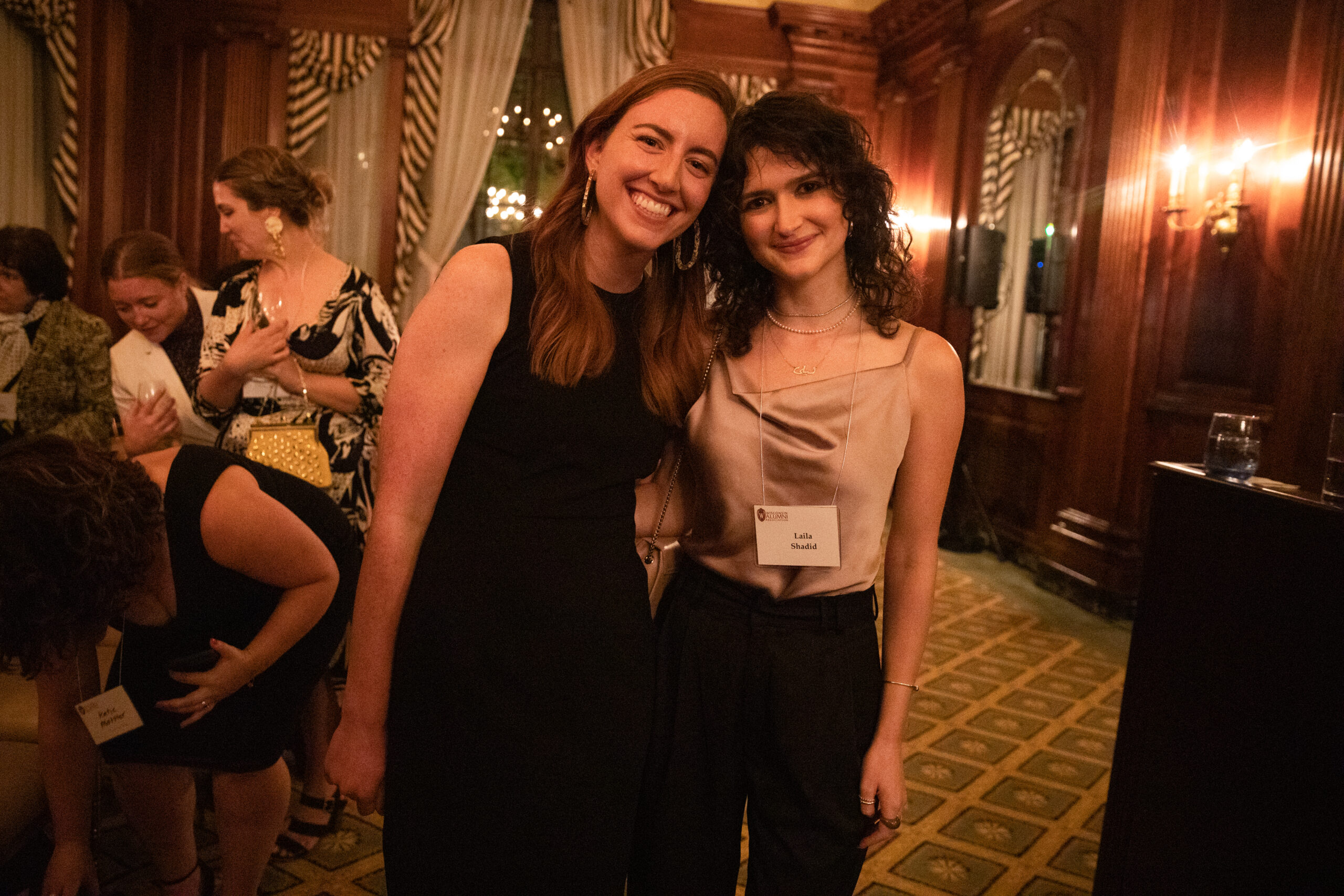
MYSTYSLAV CHERNOV, EVGENIY MALOLETKA, VASILISA STEPANENKO, LORI HINNANT, ASSOCIATED PRESS
 A team of Associated Press reporters won the 2023 Anthony Shadid Award for Journalism Ethics for their work documenting the Russian attack on the Ukrainian city of Mariupol in March of 2022.
A team of Associated Press reporters won the 2023 Anthony Shadid Award for Journalism Ethics for their work documenting the Russian attack on the Ukrainian city of Mariupol in March of 2022.
For almost three weeks, video journalist Mystyslav Chernov, photographer Evgeniy Maloletka and video producer Vasilisa Stepanenko were the last international journalists on the ground documenting the atrocities committed as Russian forces closed in on Mariupol. With AP journalist Lori Hinnant, the team brought the shocking new realities of the war in Ukraine to an international audience and put pressure on Russia to open humanitarian corridors.
The Center for Journalism Ethics presented the award on May 17 in a ceremony at the University Club in New York City.
The event also featured a moderated conversation on journalism ethics with investigative reporter and senior writer at ESPN, Steve Fainaru and award-winning journalist and author David Maraniss.
The Shadid Award judging committee lauded the extraordinary care, quick thinking and courage the Associated Press team demonstrated while covering the earliest stages of the war.
Lucas Graves, associate professor in the UW-Madison School of Journalism and Mass Communication and chair of the committee, said this year’s winner edged out a strong pool of finalists.
“Reporting from Mariupol weeks into the Russian siege, the AP team faced a string of difficult choices,” Graves said. “Like previous generations of journalists on the front lines, they had to weigh their duties as reporters and as human beings. This meant not just protecting sources but helping victims of the war — and accepting their help to avoid capture and get the story out.”
2023 Finalists
|
JESSICA CONTRERA, WASHINGTON POST
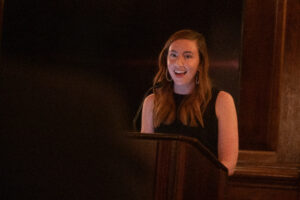
Jessica Contrera, a reporter at The Washington Post, won the 2022 Anthony Shadid Award for Journalism Ethics from the Center for Journalism Ethics at the University of Wisconsin–Madison for her stories on child sex trafficking in the U.S.
Contrera accepted the award May 17 in a ceremony in New York City. The event also featured a moderated conversation on journalism ethics with NBC Nightly News Anchor Lester Holt and award-winning journalist and author David Maraniss.
Named for UW–Madison alumnus and Pulitzer Prize-winning reporter Anthony Shadid, the award honors the difficult ethical decisions journalists make when telling high-impact stories. Shadid, who died in 2012 while on assignment covering Syria, was a member of the Center for Journalism Ethics advisory board and worked to encourage integrity in reporting.
The Shadid Award judging committee lauded the extraordinary thoughtfulness and care Contrera demonstrated in working with survivors of sex trafficking and showing how highly touted anti-trafficking laws are not being enforced.
Lucas Graves, associate professor in the UW-Madison School of Journalism and Mass Communication and chair of the committee, said this year’s winner edged out a strong pool of finalists.
“The care and nuance the Post exemplified in bringing out the stories of sex trafficking survivors stood out even among our exceptional group of finalists this year,” Graves said. “The result was a project that challenges the categories our criminal justice system takes for granted, and the reporting is already building momentum for reform.”
2022 FINALISTS
|
MARGIE MASON AND ROBIN MCDOWELL, ASSOCIATED PRESS

Investigative reporters Margie Mason and Robin McDowell of the Associated Press have won the 2021 Anthony Shadid Award for Journalism Ethics from the Center for Journalism Ethics at the University of Wisconsin–Madison for their investigative series on palm oil labor abuses.
Mason and McDowell went to extraordinary lengths to interview more than 130 current and former palm oil workers in Indonesia and Malaysia, capturing the stories of the vulnerable people producing one of the most ubiquitous commodities on the planet. They chronicled instances of rape, trafficking, slavery, child labor and routine exposure to toxic agrochemicals. Drawing on their expertise in supply chain tracking, the reporters also traced these abuses back to some of the biggest names in food and cosmetics and to banks funding this booming industry.
Named for UW–Madison alum and Pulitzer Prize-winning reporter Anthony Shadid, the award honors the outstanding ethical decision making of journalists telling high-impact stories. Shadid, who died in 2012 while reporting on Syria, was a member of the Center for Journalism Ethics advisory board and widely admired for his ethical approach to international reporting.
“We had a really outstanding group of submissions this year,” said Lucas Graves, judging chair and UW–Madison professor of journalism and mass communication. “But the winning story stood out for its global scope and the breadth of its impact. These journalists brought to light the rampant injustices undergirding the $65 billion palm oil industry. Their investigation is a masterclass in ethics and integrity, and shows how conscientious reporting can make a tremendous difference in the world.”
2021 FINALISTS
|
LAKEIDRA CHAVIS, JODI S. COHEN, JENNIFER SMITH RICHARDS, PROPUBLICA & THE CHICAGO TRIBUNE
 “The Quiet Rooms” by Jodi S. Cohen and Lakeidra Chavis of ProPublica and Jennifer Smith Richards of the Chicago Tribune won the 2020 Anthony Shadid Award for Journalism Ethics. Through careful work with vulnerable and traumatized children, Cohen, Chavis and Richards documented the unlawful use of seclusion and restraint in Illinois public schools, prompting state officials to impose an emergency ban on seclusion within a day of publication.
“The Quiet Rooms” by Jodi S. Cohen and Lakeidra Chavis of ProPublica and Jennifer Smith Richards of the Chicago Tribune won the 2020 Anthony Shadid Award for Journalism Ethics. Through careful work with vulnerable and traumatized children, Cohen, Chavis and Richards documented the unlawful use of seclusion and restraint in Illinois public schools, prompting state officials to impose an emergency ban on seclusion within a day of publication.
Lucas Graves, associate professor in the UW-Madison School of Journalism and Mass Communication and chair of the Shadid Award judging committee, said the 2020 winners showed how conscientious reporting can make a real difference.
“Cohen, Chavis and Smith had to navigate a string of difficult decisions in exposing the pattern of abuse taking place across Illinois public schools, beginning with how to find out what children went through without traumatizing them all over again,” Graves said. “This series sparked widespread reforms while also earning praise from both school supervisors and the families of children involved — a testament to how careful, thorough and honest the reporters were as they worked on the story.”
2020 FINALISTS
|
JULIE K. BROWN, EMILY MICHOT, THE MIAMI HERALD
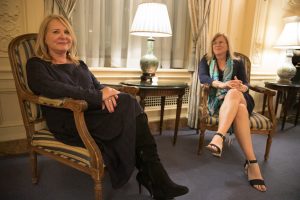
Julie K. Brown and Emily Michot (The Miami Herald) at the May 2019 award ceremony for the Anthony Shadid Award for Journalism Ethics in New York City.
“Perversion of Justice” by Julie K. Brown and Emily Michot of the Miami Herald has won the 2019 Anthony Shadid Award for Journalism Ethics from the Center for Journalism Ethics at the University of Wisconsin-Madison. This three-part series investigated how Jeffrey Epstein, a wealthy hedge fund manager, struck a secret deal with U.S. prosecutor Alexander Acosta — now the Secretary of Labor — to cover up his crimes of molesting and sexually assaulting scores of underage girls.
Named for UW–Madison alumnus and Pulitzer Prize-winning reporter Anthony Shadid, the award honors the difficult ethical decisions journalists make when telling high-impact stories. Shadid, who died in 2012 while on assignment in Syria, was a member of the Center for Journalism Ethics advisory board and worked to encourage integrity in reporting.
Lucas Graves, associate professor in the UW-Madison School of Journalism and Mass Communication and chair of the Shadid Award judging committee, said this year’s winner stood out in an exceptionally strong pool of finalists.
“The Herald’s in-depth accountability reporting had an immediate impact, including a recent verdict confirming prosecutors broke the law,” Graves said. “The Herald team told the stories of dozens of young women who were victimized first by a wealthy sexual predator and then by the justice system. We are proud to recognize the care they took in their reporting and the challenge of the ethics choices they faced.”
“Attacks on news media seem to come at a fever pitch lately,” said Kathleen Bartzen Culver, director of the Center for Journalism Ethics. “But these winners and all the finalists remind us of the power of courageous journalism practiced with integrity.”
The winning team was presented with the award May 14 in a ceremony at the University Club in New York City. Sarah Stillman, staff writer at the New Yorker, took part in a keynote conversation with Center director Kathleen Bartzen Culver.
2019 Shadid Award Finalists
- Garance Burke and Martha Mendoza, Associated Press. “The Innocents: How U.S. immigration policy punishes migrant children” was a year-long investigation into the Trump administration’s family separation policy and included stories on tender age shelters, alleged abuse in shelters, the abuse of a Honduran teen, adoption of migrant children, the scope of the migrant kids program, the billion-dollar industry of detaining immigrant children, and the waiving of FBI checks for staff at a teen migrant camp. According to the nomination, this AP team prioritized the welfare of the children they interviewed while also “[holding] those in power accountable for immigration policies that are punishing the most vulnerable.”
- Hannah Dreier, ProPublica. “A Betrayal” tells the story of a teenager and MS-13 gang member who became a government informant, only to face death threats and deportation after federal agents reneged on a promise to protect him. According to the nominating letter, Dreier “balanced the imperative to expose bad policies and abuses of power against the danger to a teenager’s life.”
- David Jackson, Jennifer Smith Richards, Gary Marx, Juan Perez, Jr., Chicago Tribune. “Betrayed” is an investigative series that exposed Chicago schools’ failure to protect students from sexual abuse and assault. According to the nominating letter, Jackson and team “applied journalistic standards honed over years of investigating sexual violence against vulnerable people” to “for the first time [quantify] the staggering prevalence of sexual violence against students in a large U.S. school district.”
- Maggie Michael, Nariman El-Mofty, Maad al-Zikry, Associated Press. Throughout 2018, these reporters investigated the atrocities occurring during Yemen’s war, publishing “Yemeni prisoners say Emirati officers sexually torture them,” “Ex-inmates: Torture rife in prisons run by Yemen rebels,” “Children as young as 10 fight, kill and die in Yemen’s war” and “AP investigation: Food aid stolen as Yemen starves.” According to the nomination letter, the AP reporters “braved dangers and faced tough ethical questions as they fought to tell stories that the world heard from no other source.”
BRIAN GROW, JOHN SHIFFMAN, & REUTERS
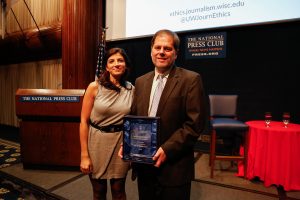
Brian Grow receiving the Shadid Award on behalf of his team in 2018. Shown here with Nada Bakri, Anthony Shadid’s widow.
Brian Grow, John Shiffman and the Reuters team won the 2018 Shadid Award. “The Body Trade” exposes the industry that dissects, rents and sells the bodies of the recently deceased. During interviews with family members of those who had donated their bodies, Grow “set aside the instincts as an intrepid reporter and relied instead on his own ethical compass, showing the families his respect for their loss and his understanding of the difficult choices many of them made,” the nominating editor wrote.
Lucas Graves, assistant professor in the University of Wisconsin-Madison School of Journalism and Mass Communication and chair of the Shadid Award judging committee, said all of this year’s finalists navigated tricky ethical questions, but the Reuters series stood out.
“This series involves a topic that is highly personal to the families of those who donated their bodies and important to everyone,” Graves said. “Reporters and editors invested in telling this story as thoroughly as possible and dealt with some unexpected landmines in a thoughtful way.”
The 2018 finalists for the Shadid Award were:
- Kristen Gelineau, Wong Maye-E and Rishabh Jain, Associated Press. “Rohingya Methodically Raped by Myanmar’s Armed Forces” is a look at atrocities documented through interviews done in a refugee camp in Bangladesh. Gelineau “faced a constant internal battle between journalistic objectivity and humanity,” a colleague wrote.
- Maggie Michael and Maad al-Zikry, Associated Press. “Inside Yemen’s Secret Prisons” found evidence of torture and other abuses in secret prisons across southern Yemen, run by the United Arab Emirates, an ally in the U.S. fight against al-Qaida. “The choices that our journalists face on the ground are difficult, but we were proud of the innovative thinking on the part of Michael and al-Zikry, as they figured out ways to keep sources safe and innovate methods to still come up with compelling storytelling,” the AP said in its nomination.
- Mike Rezendes, The Boston Globe. “Father, My Father” explored the pain and neglect experienced by unacknowledged sons and daughters of Catholic priests around the world. “Rezendes spent months gently educating these men and women that their stories would have vastly more impact if they allowed their names and life stories to be used — as long as they discussed their choice with family members in advance,” Rezendes’ editor wrote.
- Gerry Shih and Han Guan Ng, Associated Press. “Digital Police State Shackles Chinese Minority” details the repression and surveillance of Uigher communities in western China, as well as their recruitment by extremist groups in Syria and elsewhere. “Shih and Ng were exceedingly mindful of the potential risks people in this region face and sought to the greatest extent possible not to cause harm in the process of uncovering this important – and often underreported – story,” according to the AP nomination.
SHANE BAUER, MOTHER JONES
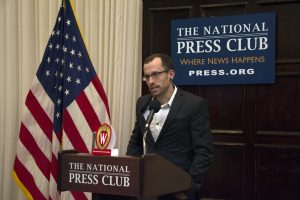
Shane Bauer accepts the 2017 Anthony Shadid Award for Journalism Ethics. Photo by Bethany Swain, bethanyswain.net.
The winner of the 2017 Anthony Shadid Award for Journalism Ethics is Mother Jones reporter Shane Bauer for his reporting on U.S. private prisons. He was presented with the award in a ceremony at the National Press Club in Washington, D.C., on April 19, 2017.
Six projects that combined aggressive reporting on important issues with care for the consequences of that reporting were finalists for the 2017 Anthony Shadid Award for Journalism Ethics.
The 2017 winner was chosen from among six outstanding examples of journalism that displayed high ethical standards in the pursuit of truth, said judging chair Jack Mitchell.
The finalists were:
- Mother Jones reporter Shane Bauer, who wrestled with the problem of journalistic deception when he spent four months undercover as a prison guard in a corporate-run Louisiana prison.
- The Spotlight team at the Boston Globe, which made sophisticated judgments in choosing when to identify victims and accused abusers while investigating sex abuse at New England private schools.
- In her series “Venezuela Undone,” Associated Press reporter Hannah Dreier balanced journalistic objectivity with her human instinct to help victims as she showed the human cost of Venezuela’s crumbling infrastructure.
- Kathy Gannon’s “Honor Bound” series for the Associated Presstook fairness and balance to an unusual level by seeking to understand the motives of men in some parts of the world who torture and murder women.
- The Palm Beach Postchose public awareness of a not widely recognized problem over individual privacy when it devoted its front page to the photos of every person in Palm Beach County who had died from a heroin-related overdose in 2015.
- In her report published in The Guardian, reporter Lauren Wolfe had to weigh whether publishing a story would do more harm than good as she brought international attention to the plight of young girls being kidnapped and raped in a village in the Democratic Republic of the Congo.
THE ASSOCIATED PRESS
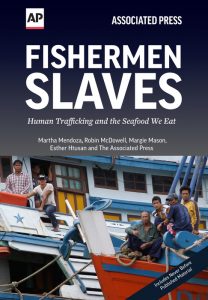 The Associated Press won the 2016 Anthony Shadid Award for Journalism Ethics for reporting that resulted in the freeing of 2,000 slave laborers used by the fishing industry in Southeast Asia.
The Associated Press won the 2016 Anthony Shadid Award for Journalism Ethics for reporting that resulted in the freeing of 2,000 slave laborers used by the fishing industry in Southeast Asia.
While investigating an Asian “slave island” that provides fish for the American market, AP reporters Martha Mendoza, Margie Mason, Robin McDowell and Esther Htusan realized that any slave who talked with them faced possible execution. The reporters and their editors decided to rescue their sources from the island before publishing the explosive story.
“There is nothing unusual about journalists protecting their sources from discovery,” Jack Mitchell, chair of the judging committee, said. “But journalists usually minimize involvement beyond that. The AP defied convention by taking responsibility for the welfare and safety of the slaves, who were willing to face death to tell their stories. The journalists got the men to safety before publishing the stories.”
The AP team was chosen for the award over four other finalists who also demonstrated exceptional commitment to ethical journalism last year. They were:
- A team of journalists from McClatchy newspapers who took care to preserve the medical privacy of victims while exposing the human toll of America’s Cold War-era nuclear energy programs.
- ProPublica and NPR, who took similar care in protecting the privacy and dignity of sick and injured employees as their reporters revealed how states across the country are curtailing workers compensation programs.
- Reporters from the Columbus Dispatch, who also dealt with privacy issues in reporting on suicides as a public health issue, while considering the probability that reporting on suicides might lead to copycat attempts.
- Milwaukee Journal Sentinel reporter Gina Barton, who faced an array of ethical challenges reopening a 40-year-old unsolved murder case that, fairly or unfairly, might reflect badly on individuals and institutions.
THE CHICAGO TRIBUNE
 The 2015 Shadid award goes to a team from The Chicago Tribune, whose revelations about serious abuses in Illinois’ juvenile justice system brought about reforms and led to the resignation of the director of the state Department of Children and Family Services.
The 2015 Shadid award goes to a team from The Chicago Tribune, whose revelations about serious abuses in Illinois’ juvenile justice system brought about reforms and led to the resignation of the director of the state Department of Children and Family Services.
The team includes David Jackson, Gary Marx and Duaa Eldeib, reporters for the Chicago Tribune, and Anthony Souffle, photographer for the Chicago Tribune.
THE ASSOCIATED PRESS

The Associated Press was awarded the 2014 Anthony Shadid Award for Journalism Ethics for its reporting on the disappearance of Robert Levinson, an American businessman.
AP reporters Adam Goldman, Matt Apuzzo and Ted Bridis proved through their reporting that Levinson, who went missing while in Iran, was employed by the CIA, even as the agency denied it to the White House, the FBI and Congress.
The AP held the story for three years until it was confident it would not cause harm to Levinson or threaten national security.
The AP team was chosen for the award over four other finalists who also demonstrated exceptional commitment to ethical journalism last year. They were:
- ProPublica and reporter Michael Grabell for reporting on the plight of temporary workers in American companies.
- Stephanie Mencimer for her story in the Washington Monthly verifying the truthfulness of Kellogg, Brown & Root, the defense contractor, when it denied that employees in Iraq had gang-raped a female employee.
- Minnesota Public Radio for documenting child abuse by priests in the St. Paul diocese, which had held itself up as a model for other dioceses to follow.
- USA Today for its examination of “mass killings” in the United States.
MARK JOHNSON, MILWAUKEE JOURNAL SENTINEL
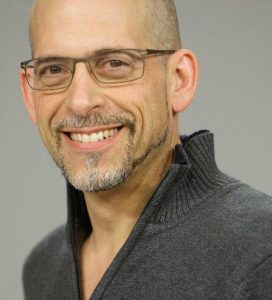 The 2013 Anthony Shadid Award for Journalism Ethics was awarded to Mark Johnson of the Milwaukee Journal Sentinel for his remarkable series on the science of gender.
The 2013 Anthony Shadid Award for Journalism Ethics was awarded to Mark Johnson of the Milwaukee Journal Sentinel for his remarkable series on the science of gender.
Johnson’s work engages the reader with personal and moving stories of people who deal every day with issues of gender identity — both their own and others’. Based on extensive scientific research, probing interviews and beautiful writing, Johnson shows both the scientific and the human face of the complex issue of gender in our ever-changing society.
From 2010-2013, our annual ethics award was restricted to nominees from Wisconsin. Beginning in 2012, the award was named in honor of Anthony Shadid. In 2014, we began accepting nominations from journalists around the world.
STEVEN T. LOVEJOY, THE JOURNAL TIMES
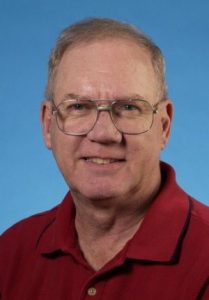 The 2012 and inaugural Anthony Shadid Award of Journalism Ethics was awarded to Steven T. Lovejoy of The Journal Times.
The 2012 and inaugural Anthony Shadid Award of Journalism Ethics was awarded to Steven T. Lovejoy of The Journal Times.
Lovejoy, a veteran of the newspaper industry, was recognized for his lifelong practice of applying the highest ethical standards to his work.
Despite the immediate challenges pressing the newspaper industry, Lovejoy remained true to the principles of ethical journalism, tackling tough issues and engaging citizens and community leaders alike to work towards positive change.
From 2010-2013, our annual ethics award was restricted to nominees from Wisconsin. Beginning in 2012, the award was named in honor of Anthony Shadid. In 2014, we began accepting nominations from journalists around the world.
DAN FLANNERY, APPLETON POST-CRESCENT
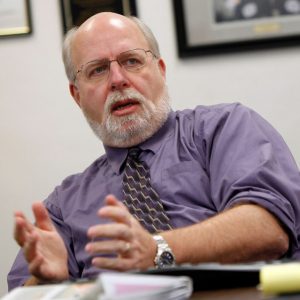
The 2011 Wisconsin Commitment to Journalism Ethics Award was presented to Dan Flannery of The Post Crescent.
Flannery oversaw the day-to-day editorial operations of The Post Crescent and its website. He has been lauded by colleagues for revitalizing the op-ed and editorial pages of the paper. Dedicated to building strong relationships with community members, Flannery doubled the number of daily commentaries and seeks out frequent guest columns for the paper to ensure that The Post Crescent reflects the diversity of voices in the Fox Valley.
From 2010-2013, our annual ethics award was restricted to nominees from Wisconsin. In 2012, the award was named in honor of Anthony Shadid. In 2014, we began accepting nominations from journalists around the world.
TOM BIER, WISC-TV
 The 2010 Wisconsin Commitment to Journalism Ethics Award was presented to Tom Bier of WISC-TV and Channel3000.com.
The 2010 Wisconsin Commitment to Journalism Ethics Award was presented to Tom Bier of WISC-TV and Channel3000.com.
With almost 40 years of tenure, Bier is regarded by many as the dean of Madison journalists. His colleagues nominated him for the award.
From 2010-2013, our annual ethics award was restricted to nominees from Wisconsin. Beginning in 2012, the award was named in honor of Anthony Shadid. In 2014, we began accepting nominations from journalists around the world.
